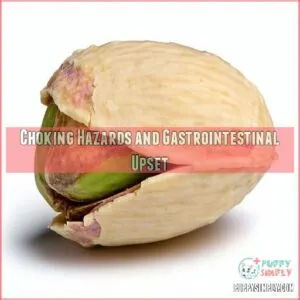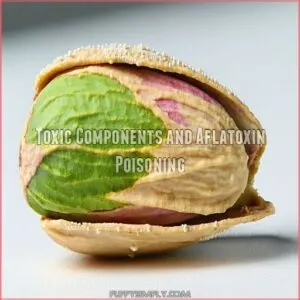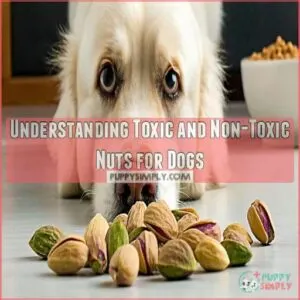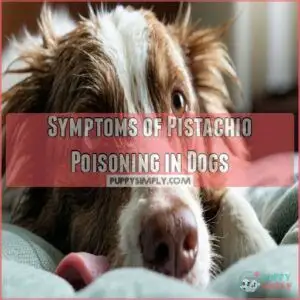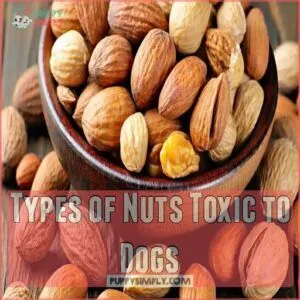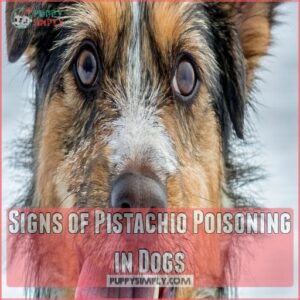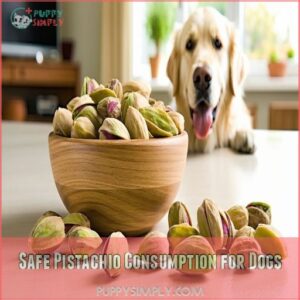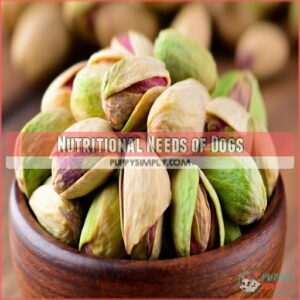This site is supported by our readers. We may earn a commission, at no cost to you, if you purchase through links.
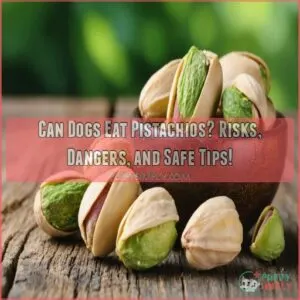
They’re not toxic, but you should treat them like a surprise birthday party—best in moderation!
Too many can lead to tummy troubles or worse, like pancreatitis, because of the high fat content.
If your furry friend sneaks one off the floor, there’s no need to panic.
Just keep quantities in check: a small dog can handle a couple, while a larger one might enjoy a small handful.
Remember, shelled pistachios are safer, and avoid any salted or flavored types.
Curious about other safe snacks for dogs?
You’re barking up the right tree!
Table Of Contents
- Key Takeaways
- Risks of Feeding Dogs Pistachios
- Can Dogs Eat Pistachios Safely
- Types of Nuts Toxic to Dogs
- Healthy Snack Alternatives for Dogs
- Signs of Pistachio Poisoning in Dogs
- Safe Pistachio Consumption for Dogs
- Nutritional Needs of Dogs
- Frequently Asked Questions (FAQs)
- Can dogs eat pistachios?
- Can one eat pasta?
- Can dogs eat pistachio ice cream?
- How many pistachios can a dog eat a day?
- Can dogs eat pistachios from Aspergillus mold?
- Are chili pistachios toxic to dogs?
- How many pistachios can a dog eat?
- Which nuts are poisonous to dogs?
- What happens if a dog eats pistachios?
- What nuts are toxic for dogs?
- How much pistachio is too much for dogs?
- Can dogs have almonds or pistachios?
- How many pistachios can a dog eat safely?
- Are pistachios beneficial for a dogs coat?
- Do pistachios help with a dogs digestion?
- Can dogs develop allergies to pistachios?
- Should puppies avoid pistachios entirely?
- Conclusion
Key Takeaways
- While pistachios aren’t toxic, keeping your dog’s intake moderated is crucial to avoid digestive issues or serious conditions like pancreatitis.
- Always opt for unsalted, unshelled pistachios if you’re giving them to your dog, and limit the serving to one or two as a rare treat.
- Watch out for symptoms of pistachio trouble like vomiting or lethargy, and consult your vet if any issues arise.
- Stick to dog-friendly snacks like lean protein or dog-formulated treats to ensure your dog’s diet is both safe and healthy.
Risks of Feeding Dogs Pistachios
When you’re thinking about sharing pistachios with your dog, remember that these tasty nuts are loaded with risks.
They can cause choking and stomach upset.
And their high fat content might lead to serious issues like pancreatitis or aflatoxin poisoning.
Choking Hazards and Gastrointestinal Upset
If you’ve ever caught your dog eyeing pistachios, think twice.
These nuts are like tiny traps for small breeds, raising choking hazards and causing gastrointestinal upset.
Imagine your pup suffering from digestive issues all because of a nutty indulgence.
Instead, consider safe nut options that are digestible and size-appropriate.
Keep your furry friend safe and sound by avoiding treats like Nerds candy, which contain high sugar content risks. Keep your furry friend safe and sound.
Pancreatitis Risk Due to High Fat Content
Besides choking, pistachios pack a hefty punch of fat.
This high fat content in food can trigger pancreatitis, a nasty inflammation of your dog’s pancreas.
Think of it like this: too much rich food is a recipe for trouble.
Here are some signs to watch out for:
- Vomiting
- Diarrhea
- Lethargy
Remember, a balanced dog diet is key to avoiding such issues.
Choose dog food choices wisely!
Toxic Components and Aflatoxin Poisoning
Aflatoxins in pistachios, those nasty toxins from moldy nuts, are the sneaky culprits here.
Aflatoxin poisoning symptoms like vomiting or lethargy can cause a tailspin in your dog’s health.
Think of it like inviting mold to your dog’s party—nobody’s idea of fun!
To keep things safe, avoid these toxic nuts entirely.
Can Dogs Eat Pistachios Safely
You might wonder if your furry friend can safely munch on pistachios, but it’s a bit more complicated than sharing a snack.
While pistachios aren’t toxic to dogs, they pose risks like choking hazards and high fat content, so moderation and care are key to keeping your pup happy and healthy.
Understanding Toxic and Non-Toxic Nuts for Dogs
It’s tricky to navigate nuts for your furry friend.
While pistachios aren’t toxic to dogs, they’re not exactly safe either.
Actually, pistachios are high in fat and can cause digestive issues in dogs according to what nuts can dogs eat.
We’ve got safe bets like cashews and almonds, but steer clear of black walnuts and macadamias—they’re downright dangerous.
Remember, moderation is key!
Keep your dog happy and healthy with proper nut choices and alternative treats.
Symptoms of Pistachio Poisoning in Dogs
Spotting pistachio toxicity in your furry friend can save them a lot of trouble.
Watch for signs like:
- Vomiting: Is your pup throwing up after snacking?
- Diarrhea: Messy trails can signal danger.
- Lethargy: More couch potato than lively?
- Appetite loss: Meals untouched?
- Abdominal pain: Whining or restlessness?
When in doubt, trust your gut and call the vet.
Safe Consumption Guidelines for Dogs
When considering if dogs can eat pistachios safely, remember that moderation is key.
Unshelled, unsalted options are safer, minimizing choking risks and sodium issues.
Think of pistachios as a rare treat, not a regular snack.
Always consult your vet before trying new treats.
Here’s a quick guide:
| Nuts | Safe? | Fat Content | Choking Risk | Sodium Concerns |
|---|---|---|---|---|
| Pistachios | Rarely | High | Yes | Yes |
| Almonds | No | Moderate | Yes | No |
| Peanuts | Sometimes | Moderate | Low | No |
| Walnuts | No | High | Yes | Yes |
| Cashews | Sometimes | High | Yes | Yes |
Types of Nuts Toxic to Dogs
Regarding your dog’s diet, some nuts are more of a trick than a treat.
Black walnuts and macadamia nuts top the toxic list, so it’s best to steer clear of these dangerous snacks.
Black Walnuts and Macadamia Nuts
So, you’ve learned about pistachios. Now, let’s talk about some nuts that are a big no-no for your furry friend.
Almonds are also toxic to dogs due to the risk of pancreatitis and obstruction.
Black walnuts and macadamia nuts top the list of toxic nuts for dogs. Consuming high-sugar or toxic foods, such as those containing onion and garlic powder, can cause serious dog health risks, including vomiting and weakness.
Always keep these out of reach! Instead, offer safer alternatives like carrots or plain chicken.
Remember, a little precaution goes a long way in keeping your canine companion healthy and happy.
Moldy Nuts and Coated Nuts
A dog’s encounter with moldy nuts or coated nuts shouldn’t be a nutty adventure.
Moldy nuts pack a punch with aflatoxin, leading to harmful effects.
Coated nuts often hide toxic ingredients like chocolate or garlic, posing serious risks.
Play it safe—treat your pup to plain, dog-friendly snacks.
It’s better than dealing with a nutty nightmare!
Nuts With High Fat Content and Sodium
Ever notice how dogs love tasty treats but aren’t the best judges of what’s healthy?
Nuts like macadamias and pecans pack a punch with high fat content and sodium.
This can trigger pancreatitis or weight gain in your pup.
Keep Fluffy’s diet balanced with healthy fat alternatives—think lean chicken or veggies—to avoid these nut-related pitfalls.
Healthy Snack Alternatives for Dogs
Don’t let your furry friend raid the pistachio stash—stick to lean protein sources like turkey or chicken, and toss them a carrot or two for crunch.
For those peanut butter fans, try dog-formulated treats or a dab of pumpkin to keep snack time safe and tasty.
Lean Protein Sources and Vegetables
Lean protein sources like skinless chicken or turkey work wonders for your dog’s health.
Toss in some dog-friendly veggies like carrots or green beans for a crunchy treat.
Remember, dogs aren’t salad lovers, so keep portions bite-sized.
These healthy dog snacks are safer than pistachios, as they don’t contain high fat content or toxic ingredients like xylitol in ice cream, giving your pup nutrients without pancreatitis risks or pistachio dog health concerns.
Dog-Formulated Food and Treats
Choosing dog-formulated food and treats helps keep your furry friend’s health in check.
Consider these three pointers:
- Opt for reputable dog food brands offering balanced nutrition.
- Analyze treat ingredients to dodge any sneaky additives.
- Keep treat frequency in mind—moderation is key to maintaining a healthy canine diet.
Your pup will thank you for keeping pet health a priority!
Peanut Butter-Flavored Dog Treats and Pumpkin
Tired of searching for safe snacks?
How about trying peanut butter-flavored dog treats?
They’re a hit with pups, providing a nutty taste without the risk.
Mix in some pumpkin, too—it’s got fiber and nutrients to support digestion and act as a low-calorie treat.
Just steer clear of adding any nuts to avoid digestive woes and pancreatitis.
Signs of Pistachio Poisoning in Dogs
You should watch for signs like vomiting or diarrhea, since these, along with lethargy and a decreased appetite, could indicate a problem.
If your pup shows any of these symptoms after eating pistachios, contact your vet immediately—better safe than sorry!
Decreased Appetite and Vomiting
Your dog’s signs of pistachio trouble might start with decreased appetite and vomiting.
Much like a human facing food poisoning, they might shy away from their bowl, hinting at discomfort.
This could be a case of intestinal blockage, which can occur if your dog has ingested sharp pistachio shells, a serious risk that requires immediate veterinary attention.
Pistachio consumption, thanks to its potential to upset the stomach, could lead to these dog health issues.
If these symptoms linger, a vet consultation is your best bet.
Lethargy and Diarrhea
Suddenly finding your dog unusually lazy and dealing with diarrhea can be alarming and messy.
These are telltale signs that pistachios wreaked havoc on their sensitive tummies.
Often, it’s not just a lazy afternoon; they’re battling dehydration, digestive upset, or even food allergies.
Keep an eye out, and if symptoms stick around, consult your vet to make sure everything is okay.
Pancreatitis Symptoms and Treatment
Vomiting and diarrhea might signal pancreatitis in dogs, a condition as unpleasant as a surprise bath. Here’s what to watch for:
- Decreased Appetite: When your dog skips meals like a teenager avoiding chores.
- Lethargy: Picture a couch potato without the TV.
- Abdominal Pain: A bellyache that needs prompt vet attention for proper pancreatitis management and diagnosis. Keep an eye out for these signs!
Safe Pistachio Consumption for Dogs
Regarding sharing pistachios with your dog, moderation is key, and you should stick to unshelled, unsalted options.
Consult your vet before introducing them, and skip the pistachio ice cream, no matter how cute those puppy eyes are!
Limiting Pistachio Intake and Choosing Unshelled Options
Spotting symptoms of pistachio trouble, like lethargy or vomiting, means it’s time for action.
If you’re looking for dog-safe pistachio products, consider checking out dog-safe pistachio options.
Keep pistachios a rare treat by giving just one or two unshelled, unsalted pistachios—think of it as the dog’s version of a guilty pleasure. This minimizes choking hazards and pesky shell issues.
Remember, moderation matters and always consider your dog’s size.
Avoiding Pistachio Ice Cream and High-Sodium Options
When choosing snacks for your furry friend, skip the pistachio ice cream and high-sodium options.
These treats can lead to salt toxicity and add unnecessary fats to your dog’s diet.
When considering treats like Lucky Charms that are high in sugar and artificial colors, opt for healthier, sodium-free choices like homemade dog treats or dog-formulated snacks.
Remember, dog treats don’t have to be gourmet—keeping them simple and safe is what’s best.
Consulting a Vet Before Introducing Pistachios
So, you’ve avoided those salty pistachio ice creams—good job!
Before giving your dog even a single pistachio, chat with your vet.
They can assess your dog’s health, considering any allergies or dietary needs.
Vet approval makes sure you’re giving safe treats, avoiding pistachio risks and keeping your furry friend healthy and happy.
Remember, it’s always better to be safe than sorry!
Nutritional Needs of Dogs
Dogs need a balanced diet rich in essential nutrients, vitamins, and minerals to stay healthy and active.
Dog-formulated foods that meet their nutritional demands should be prioritized instead of sharing your snacks.
Importance of Balanced Diets and Nutrients
Balancing your dog’s diet isn’t just about skipping pistachios. It’s like crafting a custom suit—everything needs to fit just right. Think about these three essentials:
- Make sure dog food quality to prevent nutrient deficiencies, and consider exploring healthy alternatives with dog snack options.
- Explore homemade dog food for personalized nutrition.
- Consider nutritional supplements for healthy weight management.
These can lead to healthy dog snacks and avoid high-fat foods.
Vitamins and Minerals for Canine Health
Dog health isn’t just about avoiding pistachios.
Ensuring your furry friend’s well-being involves understanding canine nutrition and focusing on essential vitamins and minerals.
Think of it as a dog food analysis—prevent mineral deficiencies and support a balanced diet.
Remember, those wagging tails deserve more than just a treat; they need a nutritious lifestyle to dodge nut allergies and pancreatitis.
Avoiding Human Foods and Choosing Dog-Formulated Options
You might think sharing your dinner with your pup shows love, but some foods don’t sit well with them. Choosing dog-safe snacks over risky human foods is a smart move.
- Pet nutrition needs are unique; stick to vet-approved diets.
- Commercial treats are crafted for canine health.
- Always prioritize what’s best in a balanced dog diet.
Frequently Asked Questions (FAQs)
Can dogs eat pistachios?
Think of pistachios as a tiny, tempting treat.
A few unsalted, unshelled pistachios are okay as an occasional snack for your dog, but they’re not ideal.
Too many can upset their tummy.
Better to stick to dog-friendly treats!
Can one eat pasta?
Sure, you can eat pasta.
It’s a versatile and tasty dish that pairs well with various sauces and toppings.
Just watch the portion sizes and balance it with veggies or protein for a satisfying meal.
Can dogs eat pistachio ice cream?
While peanut-based treats like peanuts for dogs can be a tasty alternative, pistachio ice cream isn’t a safe treat for dogs.
The high sugar and fat content, potential for xylitol, and dairy can upset their digestion.
Stick to dog-friendly snacks instead—your pup’s tummy will thank you!
How many pistachios can a dog eat a day?
Stick to one or two unshelled, unsalted pistachios occasionally for your dog.
It’s like offering a tiny treat rather than a meal, preventing any tummy troubles or choking hazards.
Always better to be cautious with treats!
Can dogs eat pistachios from Aspergillus mold?
Imagine this: you’d avoid an old, moldy sandwich, right?
Dogs should steer clear of pistachios contaminated with Aspergillus mold too.
It carries aflatoxins that can be toxic to them, causing serious health risks.
Better safe than sorry!
Are chili pistachios toxic to dogs?
Chili pistachios are a no-go for dogs.
The spice and salt can upset your pup’s stomach, causing issues like vomiting or diarrhea.
Stick to dog-friendly treats to keep your furry friend happy and healthy.
How many pistachios can a dog eat?
Did you know pistachios pack 13 grams of fat per ounce?
While they’re not toxic, they’re risky for dogs.
A small dog should eat no more than one pistachio occasionally; larger dogs can have a few more, unshelled.
Which nuts are poisonous to dogs?
Macadamia nuts are toxic to dogs; they can cause tremors and weakness.
Black walnuts are also dangerous.
Always check with your vet before giving your dog any nuts—better safe than sorry!
What happens if a dog eats pistachios?
If your dog eats pistachios, they might face an upset tummy, like that feeling after scarfing down junk food.
Pistachios can cause choking or pancreatitis due to high fat.
Stick to dog-friendly treats instead for safety.
What nuts are toxic for dogs?
Some nuts seem harmless until they aren’t—like black walnuts and macadamia nuts, which can spell trouble for your dog.
Plus, moldy nuts or those spiced with garlic can turn a snack into a veterinary emergency.
How much pistachio is too much for dogs?
Avoid giving your dog pistachios regularly.
For small dogs, keep it to one unsalted, unshelled pistachio occasionally.
Larger dogs can handle a couple more, but frequent high-fat treats aren’t your buddy’s best snack option.
Can dogs have almonds or pistachios?
Think of nuts as nature’s tiny puzzle pieces for your dog’s diet.
While almonds are generally safe, pistachios pose risks like choking and upset stomachs.
Both should be limited, and unsalted, to keep tails wagging safely.
How many pistachios can a dog eat safely?
It’s best to think small when giving pistachios to dogs.
One or two unshelled, unsalted pistachios occasionally are okay for bigger dogs.
However, it’s safer to stick to dog-approved treats to avoid health risks.
Are pistachios beneficial for a dogs coat?
Pistachios aren’t great for a dog’s coat.
They offer protein and vitamins but don’t impact fur health much.
Stick with vet-recommended foods for a shiny coat.
Save pistachios for your own snacks, without sharing!
Do pistachios help with a dogs digestion?
No, pistachios won’t magically fix digestion issues. They’re high in fat and salt, potentially causing upset stomachs or even pancreatitis. Stick to vet-approved food for a happy, healthy tummy!
Can dogs develop allergies to pistachios?
Dogs can indeed develop allergies to pistachios, just like with any food.
Symptoms include itching, redness, or gastrointestinal distress.
If your dog shows these signs after eating pistachios, it’s wise to steer clear and consult your vet.
Should puppies avoid pistachios entirely?
Yes, puppies should skip pistachios.
While tempting with their crunchy goodness, pistachios can upset little tummies and pose choking hazards.
Stick to vet-approved treats that guarantee your pup’s tail keeps wagging without the nutty risks!
Conclusion
So, thinking your furry pal can handle pistachios like a gourmet critic? Maybe, but remember, moderation is key.
Pistachios aren’t off-limits, but too many can cause tummy troubles or worse.
Stick to a few to avoid the fat overload and reach out to a vet if you’re unsure.
Just like you wouldn’t feed your dog macadamia nuts, keep other toxic nuts away, too.
Keeping snacks dog-friendly is always a safe bet!

